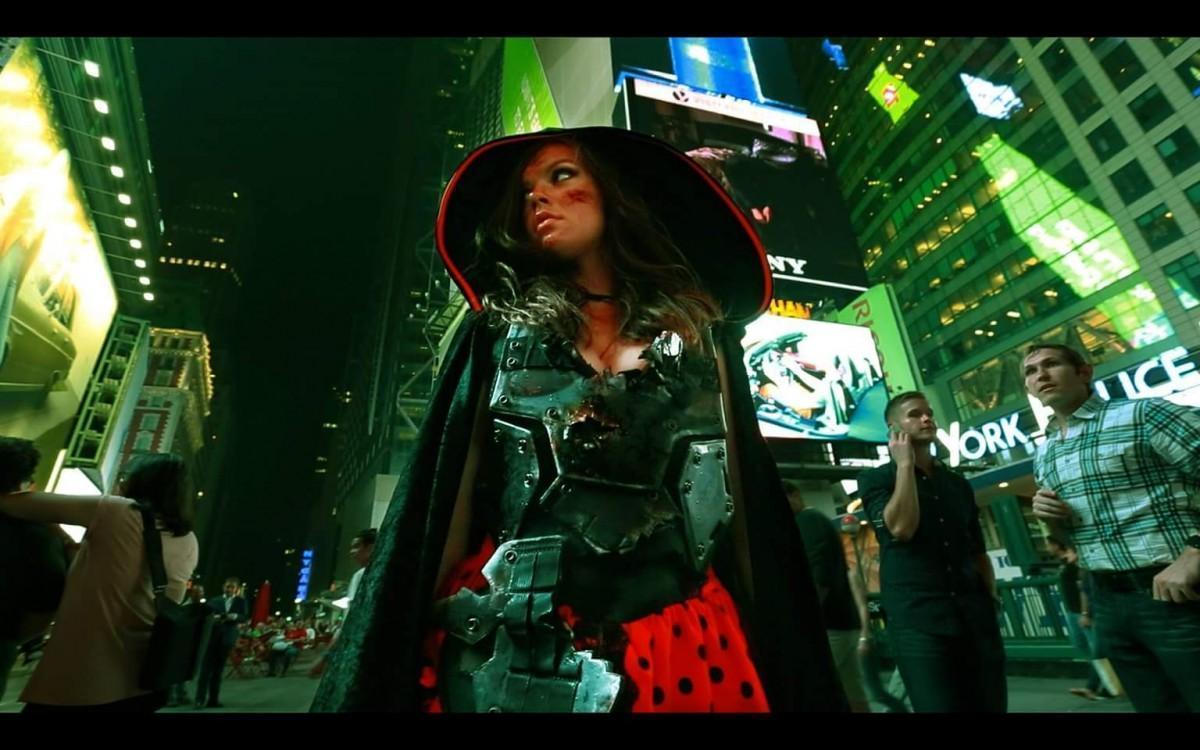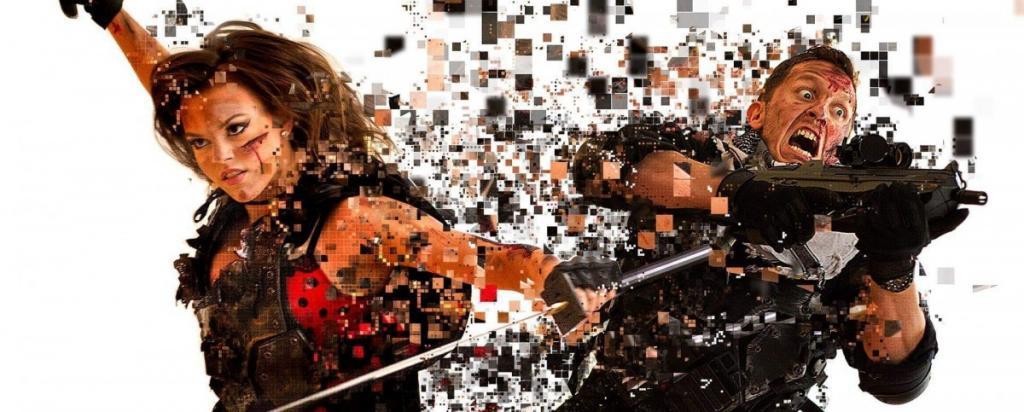
The process of independent filmmaking is often extensive and hefty. Mark Cheng knows this for a fact, one he’s aptly adapted to in the years since his long-conceived 2012 G.I. Joe fan film, Operation: Red Retrieval – a project that would plant the seed to birth the aspiring filmmaker’s partnership with living franchise legend, Larry Hama. This union would come at a critical time for Cheng in the months since going viral with a proof-of-concept for his then-hopeful feature debut, Ghost Source Zero, on which the two would ultimately pen the script as well as executive produce.
Leading the charge is producer and actor Joe Barbagallo with a story ripe with ambition in its stylish, gritty, cyberpunk B-movie flair. The first twelve-to-sixteen minutes were almost an instant thrill following an opening sequence in which a young girl named Maya (Deychen Volino-Gyetsa) is kidnapped by two men donning tactical gear, and an explosive warehouse shootout minutes later with soldiers on both sides equipped with meaty machine guns and weaponized drones. Laden with strong contours in its color grading and texture, wide-angle shots are perpetually used for the engaging cinematography amid tracer bullets, point blank killshots and accumulating gore.
Cheng’s Ghost Source Zero is set in the not-too-distant future in America where the latest polarizing election has proliferated the debate over civil rights for sentient robots. At the crux of our narrative is a tale comprised of corporate and political espionage with Jon Warnock (Barbagallo) and his battle-hardened, tough-as-nails cyber crimes unit at the center of an upscaling Senator’s off-the-books mission to procure the illegal contents of the Oon Tong, a multi-national crime syndicate. One major aspect of that mission includes intricately-planned raids at secret facilities called nodes where gamers are semi-lobotomized and imprisoned as virtual slaves.
Re-joined by fellow soldier Antonio Chavez (Kage Yami) and Lieutenant and former love interest, Soriya Sorensen (Jean Goto), Warnock and his team of grunts sets out to unravel the first of several clues in their harrowing investigation. Subliminal messages outline something more mysterious behind the digital when an unknown figure sends them a nebulous, enigmatic code, bringing to question whether or not the anonymous messenger is an ally, or a foe. Little does our team know that as they traverse the city’s neon-lit network of underground, illicit employ of sexbots, a lingerie-clad femme fatale by the name of Chimera 7 (Emily Dennis) is shadowing their every move, adding to the bodycount and bringing Warnock and his team closer to danger at every turn.
From top to bottom, Ghost Source Zero is every bit indicative of what you might expect from an independent film banner that dubs itself Planet Nerd Rage. Cheng packs on tons of cyberpunk lore to digest for its meager budget, mostly prioritizing ingenious creativity for further enhancement; Overhead and overlooking drone shots of various cityscapes and building structures, fluorescent colors and HUDs (heads-up displays) encompass the world of Ghost Source Zero, further host to the use of practical effects and costume design that revive 90s low-budget sci-fi glory.
Barbagallo’s Warnock and Goto’s Sorensen are especially central to the underlying drama as both characters share a tormented past – one with scars both emotional, physical and psychological in its wake. Warnock’s psyche isn’t beyond repair – He’s able-bodied and single-minded when it’s Go-time, although his mild PTSD does tend to rear its ugly head throughout, often putting a strain on an already reluctant partnership. Actors Yami and actress Dennis are also given ample attention for the layered characterization, in addition to actor Eric R. Lim who plays Andrew Han, a hacker with a deteriorating illness.
The acting overall isn’t hugely Oscar-worthy. Performances generally range from either terrible to average or above, coupled with some decent acting while more poignant, emotive and subtle moments along the way otherwise bring significance to the story. As indie as a film like Ghost Source Zero gets, the millieu that Cheng wraps it all in ought to leave room for even the most jaded film critic to suspend disbelief.
The action is especially characteristic and this effort between hails of bullets and hard-hitting choreography, allocated by co-star and fight choreographer Jae Greene. Select key fight sequences with combat-modified droid characters, including principals Dennis and actor Brian Yan to name a few, are given more amplified treatment through undercranking and other sorts of camera wizardry for their use in the film.
The brainchild of more than thirty years of fandom by its helmer and the infinite genius of a celebrated visionary, Cheng and Hama go all in with a palette of ideas and assembling an orchestra of experimental glee that goes boldly where science-fiction nowadays seldom goes, particularly on a mainsteam level. Such is what awaits anyone who pays attention to low-budget fantasy cinema that isn’t mainstream, while still dealing in the art of filmmaking through originality.
Upon watching the first ten minutes right through to the opening title sequence, Ghost Source Zero makes it crystal clear exactly what kind of film you’re in for as it’s not too long before body parts start getting either ripped off or shot to hell. Backed by an energizing soundtrack, a production design that steadily balances boldness and practicality in its execution, and the grace of a loyal Kickstarter following, Ghost Source Zero plays hard and heavy on its many strengths for what it packages. In whole, the film is an experiential testamant to empassioned sci-fi geekery and a lifelong devotion to fandom with as much heavy artillery, prop goo, fake blood and guts and shell casings as one could possibly allow.
I personally sought to this film in my own observation as the kind of film one would liken to the early works of Albert Pyun, something I expressed to Cheng when I messaged him over the weekend. He modestly accepted it, kind of laughed and told me I was too kind, and that I “didn’t even see” what he can do. Fair play, but I was already fine with my immediate estimation after seeing the first twelve-minutes or so. As much as I give a curve to independent features and what with all the shorts I absorb, not all directors step it up as much as Cheng has on a skeletal nature, and certainly nor are they able to abstain from the kind of self-indulgent and pretentious filmmaking that so often cripples any entertaining value on which films like these thrive (I’m talking to you, Astro).
Mind you, the acting is worse for wear in many areas which can be distracting, though the writing proves key in augmenting as many of the film’s strengths as well as its subversive, filmic appeal. On its face, Cheng’s debut bodes as a nothing short of a party for cinephiles and fans of cyberpunk and action alike. And with it, a reminder by way of the director’s own words, that the best may be yet to come.
Click the poster below and score your rental of Ghost Source Zero today.

